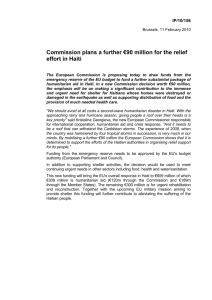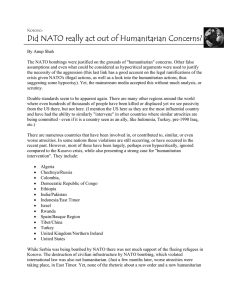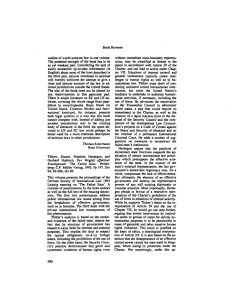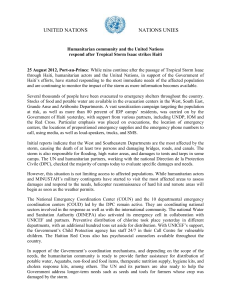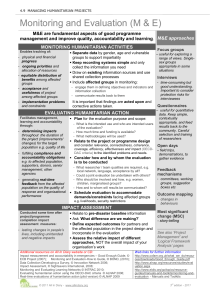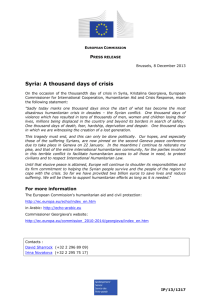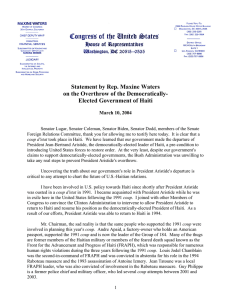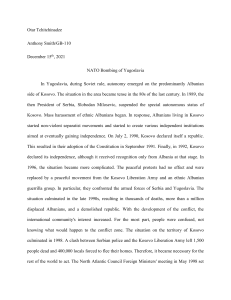(Humanitarian) Intervention
advertisement
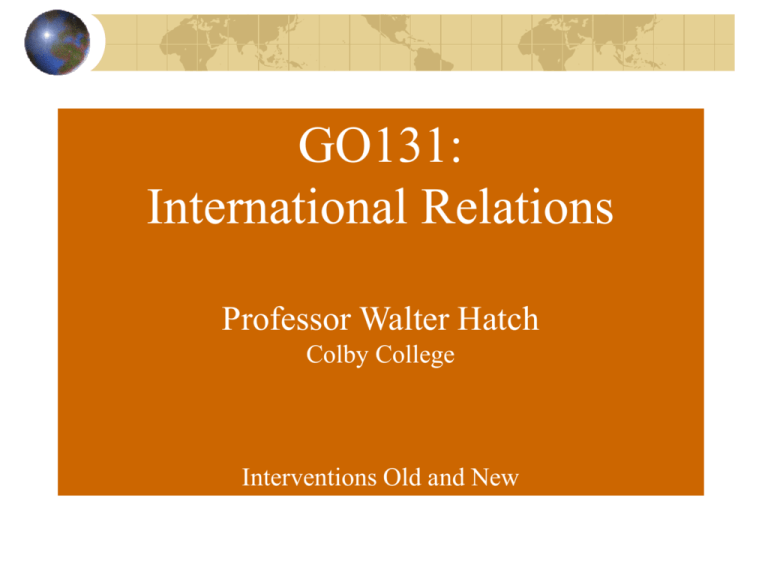
GO131: International Relations Professor Walter Hatch Colby College Interventions Old and New The Westphalian System But what if an otherwise sovereign state has “failed?” Or if genocide results? Should “we” intervene? How to Intervene Suasion Voice of America Heavy Coercion Czechoslovakia Why Intervene? “The Old Interventionism” Security reasons “The New Interventionism” Humanitarian reasons International Law and Military Intervention States should respect sovereignty of other states "All members shall settle their international disputes by peaceful means in such a manner that international peace and security … are not endangered.” (Article 2.3 of the UN Charter) “All Members shall refrain in their international relations from the threat or use of force against the territorial integrity or political independence of any state …” (Article 2.4) States should work together to repel aggression. Even here, though, UN’s authority in “collective security” is circumscribed. “Nothing in the charter shall authorize the UN to intervene in matters within the domestic jurisdiction” of states. (Article 2.7) A Loophole “Nothing in the present Charter shall impair the inherent right of individual or collective self-defense if an armed attack occurs against a Member of the United Nations …” (Article 51) May justify “Old Interventions” Review: Cold War U.S. interventions Preserving its “sphere of influence” Containing Communism Soviet interventions Preserving its “sphere of influence” Promoting Communism Review: Pre-emption as Gray Area Israel and the Osirak reactor (1981) U.S. and the Iraq war (2003) New (Humanitarian) Intervention Germany into Czechoslovakia (1939) Rescuing Germans in the Sudetenland? India into East Pakistan (1971) Defending Bengalis fighting for independence? Vietnam into Cambodia (1978) Closing the Khmer Rouge “killing fields?” Tanzania into Uganda (1979) Protecting citizens against Idi Amin? International Law Redux 1948 Convention on Genocide “crime against humanity” but …. how to stop it? Intervention only permitted in event of a “threat to international peace and security” (UN Charter, Article 39) Expanding the definition of “threat” Sovereignty or Human Rights? Realists Intervention justified only to maintain order (balance of power) Cosmopolitans Intervention justified to ensure justice (human rights) Somalia (1992-3) Background Civil strife since 1991, when Siad Barre regime ousted Rival warlords contested for power in the south • Mohamed Farah Aidid vs. Ali Mahdi War led to famine, humanitarian crisis Famine in Somalia Humanitarian intervention UN spent $675 million GHW Bush: 25,000 US troops Clinton: Taking Mogadishu (October 1993) 18 U.S. Rangers killed Blackhawk Down Haiti (1994) Background Aristide elected president Populist priest Ousted in military coup Violence between army and pro-Aristide Aristide supporters Refugees flee Haiti Floating to U.S. Humanitarian Intervention Clinton deploys troops Aristide restored to power Troops leave in 1999 Aristide wins new election in 2000 Back to Haiti (2004) Bosnia (1992-5) Background New republics break away from former Yugoslavia (dominated by Serbs) Slovenia Croatia And, in 1992, Bosnia-Herzegovina • 44% Muslim; 31% Serbian; 17% Croatian War erupts after Bosnian Muslims and Croats vote for independent state “ethnic cleansing” by Serbs Humanitarian Quasi-Intervention Srebrenica Violence Ends the Violence NATO Croat-Muslim offensive Dayton Peace Accord Kosovo (1999) “Ethnic Cleansing” Redux Role of the Media NATO Strikes Back NATO airstrikes on Serb targets NATO ground troops enter Kosovo Serbian minority flees in face of reprisals A New Exodus The Iraq War New or old intervention?
